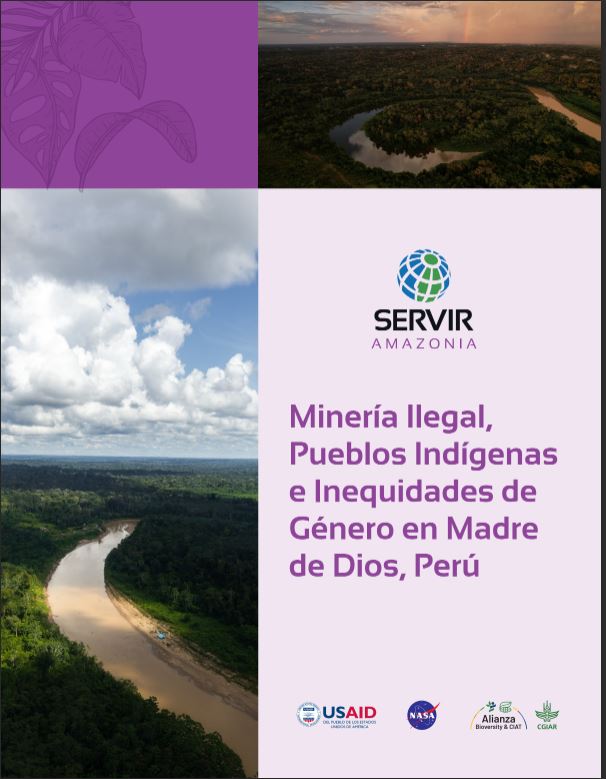Minería Ilegal, Pueblos Indígenas e Inequidades de Género en Madre de Dios (Perú)
Abstract
(English below)<br><br>
El estudio Minería ilegal, pueblos indígenas e inequidades de género en Madre de Dios, a cargo de la Mag. Marina Irigoyen Alvizuri, socióloga, asesora en género del <strong><a rel="nofollow" target="_blank" href= https://servir.ciat.cgiar.org/>Programa SERVIR-Amazonia</a></strong>, ha llevado a cabo un análisis de género que busca identificar, comprender y explicar los diferentes roles, carencias y oportunidades de hombres y mujeres –como individuos y como grupos sociales– y las relaciones entre ellos, en la región de Madre de Dios (Perú) con respecto a la minería ilegal. <br><br>
Se ha considerado que los sistemas georreferenciados y en especial <strong><a rel="nofollow" target="_blank" href= https://dev2.acca.org.pe/plataforma-rami/>RAMI</a></strong> (Radar Mining Monitoring), una tecnología que hace uso de imágenes de radar, ofrecen la oportunidad de identificar rápidamente posibles nuevos frentes de minería ilegal en áreas prioritarias. <br><br>
Las asociaciones de productores forestales y comunidades comprometidas en la lucha contra la minería ilegal pueden recibir alertas a la vez que complementan esa información, en particular la <strong><a rel="nofollow" target="_blank" href= https://dev2.acca.org.pe/plataforma-rami/>FENAMAD </a></strong>(Federación Nativa del Río Madre de Dios y Afluentes) como entidad representativa de las poblaciones indígenas, promoviendo el involucramiento de las mujeres y poblaciones afectadas.
<br>
<br>
<br>
The study on illegal mining, indigenous peoples, and gender inequity conducted in Madre de Dios by the <strong><a rel="nofollow" target="_blank" href= https://servir.ciat.cgiar.org/>SERVIR-Amazonia Program’s</a></strong> Sociologist and Gender Advisor Marina Irigoyen Alvizuri has carried out a gender analysis with the purpose of identifying, understanding, and explaining the different roles and opportunities for men and women—as individuals and as groups—as well as the relationships between them in the Madre de Dios region (Peru) with regard to illegal mining. <br><br>
Georeferenced systems, and especially <strong><a rel="nofollow" target="_blank" href= https://dev2.acca.org.pe/plataforma-rami/>RAMI</a></strong> (Radar Mining Monitorin), a technology that uses radar images, have been considered to offer the opportunity to quickly identify potential new illegal mining fronts in priority areas. <br><br>
The forest producers’ associations and communities committed to fight illegal mining can receive alerts while complementing this information—particularly <strong><a rel="nofollow" target="_blank" href= https://dev2.acca.org.pe/plataforma-rami/>FENAMAD </a></strong> (Federación Nativa del Río Madre de Dios y Afluentes) as an entity representing indigenous populations—to advocate for the involvement of women and affected populations.

